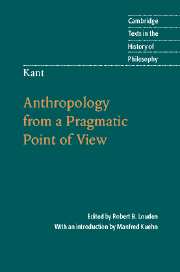Book contents
- Frontmatter
- Contents
- Introduction
- Chronology
- Further reading
- Note on the text and translation
- Anthropology from a Pragmatic Point of View
- Preface
- Contents
- Part I Anthropological Didactic. On the way of cognizing the interior as well as the exterior of the human being
- Part II Anthropological Characteristic. On the way of cognizing the interior of the human being from the exterior
- A The character of the person
- B The character of the sexes
- C The character of the peoples
- D The character of the races
- E The character of the species
- Index
- Cambridge Texts in the History of Philosophy
A - The character of the person
Published online by Cambridge University Press: 05 June 2012
- Frontmatter
- Contents
- Introduction
- Chronology
- Further reading
- Note on the text and translation
- Anthropology from a Pragmatic Point of View
- Preface
- Contents
- Part I Anthropological Didactic. On the way of cognizing the interior as well as the exterior of the human being
- Part II Anthropological Characteristic. On the way of cognizing the interior of the human being from the exterior
- A The character of the person
- B The character of the sexes
- C The character of the peoples
- D The character of the races
- E The character of the species
- Index
- Cambridge Texts in the History of Philosophy
Summary
From a pragmatic consideration, the universal, natural (not civil) doctrine of signs (semiotica universalis) uses the word character in two senses: because on the one hand it is said that a certain human being has this or that (physical) character; on the other hand that he simply has a character (a moral character), which can only be one, or nothing at all. The first is the distinguishing mark of the human being as a sensible or natural being; the second is the distinguishing mark of the human being as a rational being endowed with freedom. The man of principles, from whom one knows what to expect, not from his instinct, for example, but from his will, has a character. – Therefore in the Characteristic one can, without tautology, divide what belongs to a human being's faculty of desire (what is practical) into what is characteristic in a) his natural aptitude or natural predisposition, b) his temperament or sensibility, and c) his character purely and simply, or way of thinking. – The first two predispositions indicate what can be made of the human being; the last (moral) predisposition indicates what he is prepared to make of himself.
On natural aptitude
To say that the human being has a good disposition means that he is not stubborn but compliant; that he may get angry, but is easily appeased and bears no grudge (is negatively good).
- Type
- Chapter
- Information
- Kant: Anthropology from a Pragmatic Point of View , pp. 185 - 203Publisher: Cambridge University PressPrint publication year: 2006



